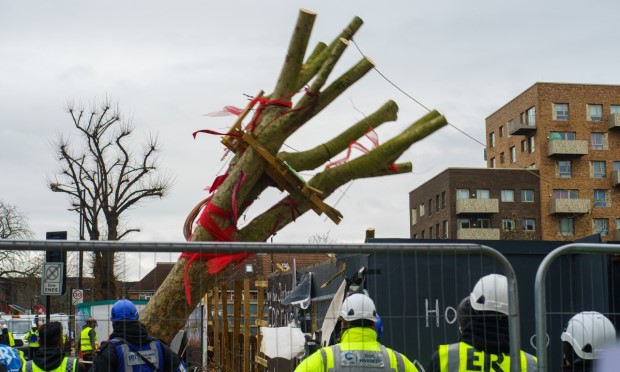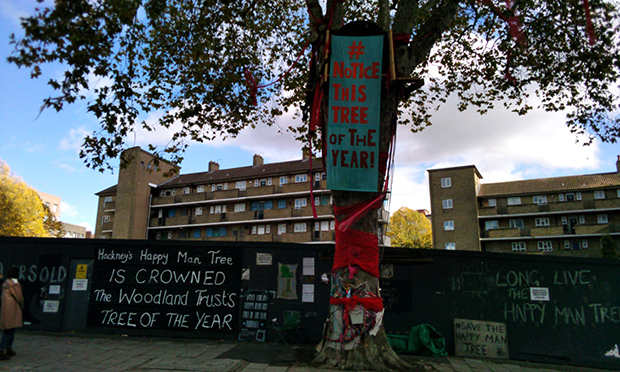‘It struck fear into us’: Happy Man Tree campaigners slam Town Hall for ‘overreach’ in court injunction

Campaigners who worked throughout last year to save the Happy Man Tree from felling have hit out at Hackney Council for “overreaching themselves” in applying for a court injunction to end the protest.
The political fallout from the decision to cut down the venerable London plane continued with both local Labour and Green party activists speaking out in the wake of last week’s scenes in which cries of ‘Shame’ were heard as the tree, which had been the focus of activism for months, was finally brought to the ground.
Community members have now revealed their shock and upset at a low point reached in relations between the council and campaigners last year, when a High Court injunction was sought by the Town Hall to end further protest around the tree, with a breach of its terms potentially putting those names in the documents in contempt of court and liable to be imprisoned.
Save the Happy Man Tree campaigner Peter Buckingham said: “It felt like we were meeting a machine, a great big monolithic sledgehammering machine, that rolled on saying the same things over and over again, without engaging on any human level.
“I just imagine a different universe where the Mayor, or the chief executive of the council, had just come down and talked to us, we were there all the time, and said, ‘Yes, this is really painful having to take this out’. But it never happened.
“Where I’m at now a week after the tree’s been cut down, wondering where we go next, is that the capacity for anyone to have a proper dialogue around what happened, how we got to such a bad position collectively; none of those things are happening as far as I’m aware.
“How do you heal the community, as well, as it is split on this, and that’s a painful split. Some point to us as if it’s our fault for delaying the building; actually I don’t think we delayed it by one jot.
“It steamrollered through without ever attempting to address any of the concerns an awful lot of people have around the destruction of trees in the Woodberry Down estate.”
According to Buckingham, the injunction came as a complete shock to protesters at the tree, with the first he was aware of the move being the arrival of bailiffs turning up with wodges of papers which they affixed to the tree and hoardings, with a court case scheduled for four working days’ time.
Five protesters were named in the injunction, including members of the Woodberry Down Community Organisation (WDCO), which takes part in decisions on the future of the regeneration of the estate alongside the Town Hall and Berkeley, with papers mentioning three members of the Gosnell family, of whom two were named defendants in the injunction.
Elaine Gosnell said: “Now in my community, there is a swathe of people who remain convinced that I must have been doing wrong. Why else would we be deserving of such punishing, humiliating treatment by Hackney Council? We all continue to experience consequences resulting from this action.
“The High Court orders were served at the tree at about 5pm, Friday 19 June, with the hearing a week later at 10.30am. We had, in effect, six days’ notice. It struck fear into us as intended.
“Would I have to attend the High Court in person? How would I address a High Court judge? We stood to be banned from a 35-metre stretch of a street for months and were at risk of fines or imprisonment; where could I find an appropriate solicitor? How much would it cost? Could I get Legal Aid?
“We had so little time and were all working full-time. To defend ourselves we had to study the two-inch deep pile of court orders served on us by the Mayor and Burgesses of Hackney and Berkeley and submit a written skeleton defence. It took me four days to recover.
“We learned that legally, the council was right to join us to the action initially, because we were identified at the tree. So, however unlikely it was that we were occupiers, trespassers, it was right to construe that we were such.
“Was this morally right, particularly when, of the people targeted and named, three were from one family? Given consequences were inevitable, how do you think we have been left feeling?”
Gosnell pointed to the judgment of the case making clear that she and her family had “acted perfectly properly and lawfully and that their presence as a named defendant in this claim does not reflect badly on them in any way”, going on to praise them for “their honesty and public spirited natures”.

Campaigners blocked the Happy Man from being felled by interposing themselves between workers and the tree in May of last year, while erecting a platform in its branches, holding events in support of saving it from removal, and vowing not to leave its side.
An alternative scheme was also worked up and designed by the campaign envisioning a retention of the tree while relocating the homes which necessitated its removal to another part of the Woodberry Down estate, with Berkeley Homes admitting that if they had been aware of concerns around the tree at an earlier point, a different design would have been taken.
Buckingham added: “There is an alternative scenario here of having a conversation about where we are and what we were trying to do, and then if we cannot resolve this, then you serve an injunction. That could have happened. What I don’t know is what the result of any conversations would have been about that, but at least human beings would have appeared behind the rhetoric on both sides.
“I don’t know if we were viewed as radical protesters that needed to be evicted, and therefore the full force of bailiffs needed to come down, but there was a missed opportunity to allow people to say, ‘If you carry on like this, this is what we are going to do, but we may also consider that things may need to change in the future’.
“What happened instead is this huge great sledgehammer came with all its full force, and we had to go to court. Then the injunction was triggered in December, and then it was taken down.”
Back in June, the council argued that it had been “in dialogue” with locals on the tree since autumn of 2019, pointing to an 18-month consultation and to two of the protest organisers meeting with Berkeley Homes in May to discuss the matter, where the Town Hall said the campaign made clear that the protests would continue.
A spokesperson added at the time that the council considered that protesters had been “afforded a proper opportunity to express themselves and exercise their right to assembly”, but that both the Town Hall and Berkeley Homes had felt without options but to take legal action to ensure there were no further delays to construction on the estate.
The decision to fell the tree has drawn condemnation from Hackney Green Party, with local coordinator Alice Bennett challenging the council to explain how it would ensure the 175 new replacement trees planted in the wake of the Happy Man’s felling would reach maturity, pointing to the death of a number of young trees following a council-supported community planting project on Hackney Marshes.
The Greens have also questioned why the Town Hall and Berkeley did not prioritise the conservation of mature trees such as the Happy Man when the regeneration was being planned.
Meanwhile, the Woodberry Down branch of Hackney Labour has openly spoken of its “deep regret” at the loss of the tree as well as “the schism it has caused in our community”.
A spokesperson said: “We do not believe that there had to be a choice between preserving the tree and social housing. We call on the Mayor of Hackney to confirm Tree Protection Orders on other trees in Woodberry Down and to make good on the Council’s commitment to ensure that future plans work around mature trees and other green infrastructure rather than cutting them down, and make every effort to dialogue with all sections of the community at an early stage in the planning process.”
In a recent interview with the Citizen, Hackney Mayor Philip Glanville apologised for the “upset and sadness” caused to the Gosnell family by the injunction, adding that, as with the process around compulsory purchase orders (CPOs), while “nobody wants to see a CPO go all the way through to the end and forcibly remove somebody from their home… you have to protect the timeline of a process that has been worked through and consulted on for a number of years”.
Glanville added that lessons had been learnt by the council on “the value of place and heritage” as a result of the debate around the tree, going on to note that while Save The Happy Man Tree may have failed to save the tree itself, that it had succeeded in securing a “substantial increase” of trees and green infrastructure as part of the Woodberry Down regeneration.
The borough leader added: “None of the decisions around the Happy Man Tree were taken lightly. The discussions around alternatives now date back over a year and a half. What is really clear is that the value that local residents place in heritage, green infrastructure, trees and the quality of the built environment in terms of sustainability is very, very high indeed.
“But they also recognise that residents in Phase 4 [of the regeneration project] and those in Phase 3 that have been decanted already deserve to come back to those 120-odd new social rented homes too. They are really supportive that we are now able to get on with delivering Phase 3, while recognising the sadness that the loss of any tree represents.
“I don’t relish the felling of the Happy Man Tree, but I recognise it was taken in a transparent and democratic process both locally in terms of resident support but also through the planning system, through deep engagement and consultation and also a look at alternatives, and that includes alternatives to do that safely. Ultimately the safety of people that are protesting is really important.
“It wasn’t just about a tree, it was also about that heritage and sense of place. That I think we can fix in many different ways, in the naming of buildings, the designing of buildings, the use of brick, what Woodberry Down means to the history of the borough, seeing that all reflected.
“Those are the sorts of conversations they want to have and there is a brand new town square that comes in Phase 4 – how does that square speak to people, those sorts of things are really important to people. So the campaign won in that sense – it won that argument, and that is what we will take forward into future phases.”
